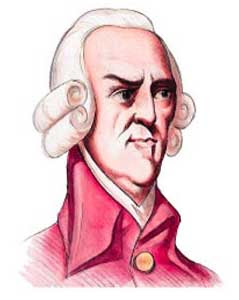As part of the second instalment of the Future Capital Series, I see it fit to discuss what capital is. Once the discussion is made, we can go on to understanding how according to Hernando de Soto, Undercapitalisation or "Dead Capital" is the main encumbrance to our development not only as a continent but as the third world. Through this understanding, I take it that the real causes of our problems will be clearer. It is human nature and condition to look for the easiest excuse or the least demanding excuse and run away from seeking the real truth. The issue of Capital falls under that bracket of human beings intellectual convenience.
Capital is defined by classical economists as "that part of a country's assets that initiates surplus production and increases productivity". Furthermore, The Economist defines capital as "money or assets put to economic use, the life blood of capitalism... one of the four essential ingredients of economic activity, the factors of production along with land, labour and enterprise. Adam Smith goes further and distinguishes between circulating capital now known as "working capital" and fixed capital. The former including money, commodities and raw materials while the latter includes land, buildings and mines.
Capital is very important in a market economy... Adam Smith in his book "Wealth of Nations" gives three clues as to why this is so. The first clue is when he says that " the quantity of industry, therefore not only increases in every country with the increase of the stock (capital) which employs it, but, in consequence of that increase, the same quantity of industry produces a much greater quantity of work". Here he links increasing capital to increasing work and industry. Further he adds that "all the accumulation of stock must, in the nature of things be previous to the division of labour, so labour can be more and more subdivided in proportion only as stock(capital) is previously more and more accumulated". We see now that capital is not only important for increased industry and employment but also for productivity and division of labour. All these factors are important for growth.
The last clue takes on a more personalised note when in reference to an individual "he endeavours, therefore, both to make amongst his workmen the most proper distribution of employment, but to furnish them with the best machines which he can either invent or afford to purchase. His abilities, in both these respects are generally in the proportion to the extent of his stock(capital)". Clearly then we see that capital is important for both the development of society but also for personal economic development.
If this is the case then one wonders, does that mean now that Africa or Kenya lacks capital? If the relationship between capital and growth has been so well articulated, is it then that we lack capital?. A reasonable mind will clearly then see that this is not the case. Africa is one of the most well endowed continents in the world, with arable land, diamonds, gold, rivers, lakes and a healthy population we clearly have bucket loads of capital. Why then cant this capital as Adam Smith put it "increase the quantity of industry and in consequence (increase) a much greater quantity of work"?
Here is where Hernando de Soto comes in. His argument is both simple and elegant. Africa and in general the third world has what he calls "Dead Capital". De Soto adds one element of Smith's argument that I have deliberately left out. This is that "for accumulated assets to become active capital and put additional production in motion, they must be fixed and realised in some particular subject... which lasts for some time at least after the labour is past". Here he brings in the concept of formalised property rules. These rules are the ones that fix the accumulated assets in some particular subject which in this case is law. In the West, the difference is that assets are able to live a parallel life both as assets and as capital. Here in Africa we just have assets.
The notion here is that capital is abstract, like a ghost if you will. An abstraction that lives in people's collective minds, collective in that they are gathered in the law. Simonde de Sismondi, a swiss economist as cited in the Mystery of Capital says that capital is a "permanent value, that multiplies and does not perish... Now this value detaches itself from the product that creates it, it becomes a metaphysical and insubstantial quantity always in the possession of whoever produced it, for whom this value could be fixed in different forms". Capital then to me is like molten iron, it can be moulded and shaped by the blacksmith into whatever form he wants so as to derive extra value from his labour.
The issue is that as a people we have come to think of capital as money. It has become the colloquial definition of capital. For business, we have to "raise capital" so as to start the business. The argument put forward by these great economists is that capital is whatever the owner wants it to be so long as there are standardised rules that allow for these different interpretations.
From this perspective it is clear then that a lack of understanding of what capital is has been part of the problem. African governments have confused capital with money and over inflated their economies by pumping money into the economy. Not realising that money is just one of the many forms of capital. To drive this point home. Imagine a matatu tout who has a brilliant mind, a person who comes up with business ideas at a whim. He gets a salary from the owner of the matatu but cannot formally lay claim to his assets (the salary), he therefore lacks capital as in a formalised system, the collective minds of the country would interpret this salary as a formal regular cash flow towards him. He therefore cannot get a loan from the bank as they cannot formally and in a standardised manner lay claim to his capital as collateral. His business ideas which are his intellectual and human capital remain locked in his brain and therefore do not add value and generate wealth. This is what is called dead capital.
Furthermore, imagine two parties, a maasai herdsman who owns cattle and a rancher who owns lush fields. They both have assets, what if the herdsman could reach an agreement with the rancher that allows him to herd his cows on the ranchers fields in exchange for first options on the proceeds from the sale of the herdsman's cows. They would both have great incentives to cooperate because fatter cows would mean higher prices for the cows, whatever stake the rancher would be getting would be proportionate to the health of the cows. He would even fertilise his grass so as to reach this end. However, this would all be impossible if the property laws of the country are not formal, standard and flexible so as to allow the interpretation from these entrepreneurial minds of their parameters.
Dead capital then is the main issue in the third world. The assets and wealth are there but there are no rights that allow these assets and wealth to live their parallel life. There is no furnace to melt the iron ore so that the blacksmith can create value through his labour.
Next week, the discussion will be taken further. The article will be about the economic and financial implications of dead capital. For a more nuanced explanation, I recommend that you read "The Mystery of Capital" by Hernando de Soto. For me it is the most important book that any third world economist or thinker can read.
Search
About Me
- Samora
- Kenyan economic and financial research analyst.
Labels
agriculture
Balance of Payments
Business
Capital
Capital formation
Capitalism
CBK
Civil Service
Commodities
constitution
corruption
CPI
Currency
Debate
Different
EAC
Economic thought
Economics
Economy
education
Finance
Financial Reform
Freedom
GDP growth
Geopolitics
Hernando De Soto
ICT
incentives
inflation
Infrastructure
Innovation
Insurance
Interest Rates
Intergenerational Mobility
Investments
Kenya
media
monetary policy
money laundering
Mortgages
NSE
Pensions
Politics
property rights
quirkynomics
Real estate
Safaricom
Stimulus Programme
stocks
Taxation
Total Factor Productivity
vision 2030







0 Comments Received
Leave A Reply